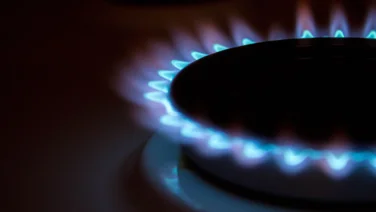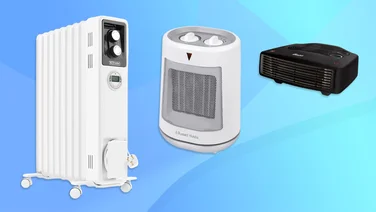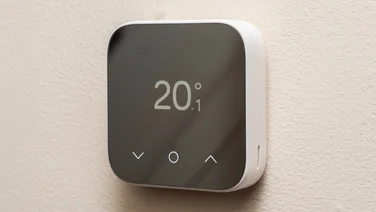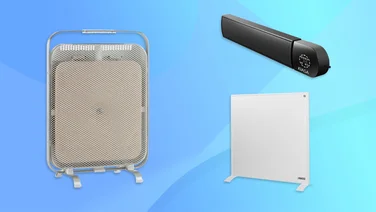To help us provide you with free impartial advice, we may earn a commission if you buy through links on our site. Learn more

Slowly but surely, growing numbers of UK households are replacing their old, gas-guzzling boilers with a more eco-friendly heat pump.
Figures from the Microgeneration Certification Scheme (an independent organisation that certifies renewable products and installers) show that the number of heat pump installations in the UK rose to 35,000 in 2023 – an increase of 7,000 over the previous year.
One reason for this increase has been a boost in grants available to homeowners under the Boiler Upgrade Scheme, which was raised to £7,500 per household in October.
Heat pumps are fairly common these days, and it’s likely they will become more widespread in the years to come. It seems likely that gas boilers will be banned in all new-builds from 2025, leaving heat pumps as one of the most popular remaining heating technologies.
So, now’s the ideal time to learn how these energy saving devices work. This article will take you through everything you need to know about heat pumps – from the basic facts to the in-depth technical detail.
READ NEXT: Best air source heat pumps
Heat pumps: The basic facts you need to know
- There are two main types of domestic heat pump: air source heat pumps (ASHPs) and ground source heat pumps (GSHPs).
- Both types of heat pump capture energy from outside your home to use in parts of your heating system.
- ASHPs are installed on the outside of a building, and they use thermal energy from the air.
- GSHPs are installed underground near a building, and they use thermal energy from the ground.
- Heat pumps tend to use less energy than a traditional gas boiler. This can make them more energy efficient.
- However, heat pumps do use some electricity to produce the desired output temperature.
- Heat pumps can fuel various heating and cooling system components, including radiators, under-floor heating, the hot water supply and air conditioning units.
- You can apply for a government grant to help with the cost of a heat pump installation, via a qualifying heat pump installer. These Boiler Upgrade Scheme (BUS) grants were increased to £7,500 in 2023.

How does a heat pump system work?
To keep things simple, let’s start by looking at a ground-source heat pump water heating system.
In a system of this type, where thermal energy is taken from the ground, there are three closed loops of liquid that interact to heat your home:
1. A ground loop filled with water. The water gains some heat energy from the ground.
2. The heat pump itself has a refrigerant line filled with a liquid/gas refrigerant. The water from the ground loop is used to increase the temperature of the refrigerant until it boils (at a very low temperature, around -15 ºC.) The refrigerant is passed as a vapour into an electrically powered compressor, which further increases the temperature of the vapour. Next, the refrigerant vapour enters a condenser where it reverts to a liquid state, while giving off some of its heat.
3. The home heating system (for example radiators and connected pipes) is filled with water and this is warmed to the required temperature by the thermal energy given off by the refrigerant as it condenses.
Once the refrigerant has reverted to a liquid state, it passes through an expansion valve which causes its temperature and pressure to drop. Now that the refrigerant is cool enough to absorb more heat from the ground loop, the cycle begins again.

Air source heat pump water heating systems work similarly. The key difference is that air is used, instead of water, in the first step of the process. Air is circulated over the heat pump system, and this warms up the refrigerant inside, providing the energy input needed to start the whole process.
READ NEXT: Are heat pumps worth it?
Heat pumps: In numbers
- 380,000 UK heat pumps were installed by April 2023 – an impressive number, but it’s still far short of the government’s target of 600,000 heat pump installations per year by 2028.
- 10% per year is a good ballpark figure for an estimate of the energy consumption saving that’s possible when you replace a gas boiler with a heat pump, though the figure will depend on the heat pump’s efficiency.
- £103 would be the approximate yearly saving for a medium-sized household switching to a heat pump, based on calculating 10% of heating cost estimates from British Gas.
- 23 tonnes of CO2 emissions could be saved over 10 years, if you switch your home to a heat pump. (That’s the same as 30 return flights between Heathrow and Madrid).
- £7,500 Boiler Upgrade Scheme (BUS) grants are available to help property owners with the costs of heat pump installation, subject to qualifying criteria.
- £3,500 to £8,900 is EDF’s estimated cost range for purchase and installation of an ASHP, factoring in a £7,500 BUS grant.
READ NEXT: Best solar panels UK
What is heat pump refrigerant?
As we’ve discussed, the use of compounds or mixtures called refrigerants is essential to how heat pumps operate. You’ll never see this substance, but it’s key to the device’s ability to transfer thermal energy from the outside world into your home.
Various types of refrigerant are used in heat pumps, including:
- Hydrocarbon refrigerants like R290
- Carbon-dioxide refrigerants like R744
- Hydrofluorocarbon (HFC) refrigerants like R32 – though some of these are being phased out due to their high global warming potential (GWP)
Individual models of heat pump are designed to use specific types of refrigerant. For example, the Worcester Bosch Compress 7001iAW, which we named the best air source heat pump you can buy, uses R410A (an HFC) refrigerant specifically.So, when choosing a heat pump for your home, it’s a good idea to find out which refrigerant is used in each model that you’re interested in, so that you can compare the pros and cons in terms of safety, environmental impact and so on.
You shouldn’t need to have the refrigerant in your heat pump replaced at any time after installation. However, in the event of a leak, you’ll need to call in an expert technician to repair the pump, replace the lost refrigerant and ensure the leaked refrigerant is identified and dealt with safely. Never handle leaked refrigerant, and never try to replace the refrigerant in your heat pump – many of these compounds are hazardous.
All heat pump refrigerants have their weaknesses, whether that’s in terms of their toxicity or their potential environmental impact. Thankfully, the options available today are better, in many ways, than the refrigerants of yesteryear.
Some earlier refrigerants used in appliances such as refrigerators were called chlorofluorocarbons, or ‘CFCs’. Products in this family – especially Freon-12, or dichlorodifluoromethane – revolutionised the field of refrigeration. However, they also contributed seriously to ozone depletion and global warming, leading eventually to bans in the 1980s and 1990s.
READ NEXT: Air source heat pump grants UK – explained
How to operate a heat pump
Heat pumps are complicated machines – and this is sometimes reflected in their controls, which can take a while to master. (The same could be said of the controls on other heating devices like gas boilers.)
This sentiment is echoed by the Energy Saving Trust which says: “Although overall household satisfaction with the warmth and comfort provided by a heat pump is very high, many householders have difficulty understanding the instructions for operating and using their heat pump, which impacts on performance.”
Typically, heat pump systems are operated via an adjustable controller and room thermostat. These devices will give you options to:
- Set the heating system temperature
- Set timed temperature spikes in a system that provides hot running water (a crucial measure to eliminate the risk of contracting Legionnaires’ disease from the water)
- Schedule the pump’s on/off times
- Receive system status/error information
Controls vary between heat pump models, so we would suggest you research how a certain heat pump is controlled before you get it installed (and read the instruction manual before use).
Do heat pumps require maintenance?
Neither of the two most common types of domestic heat pump – GSHP or ASHP – should require much ongoing maintenance. However, if you have an air source heat pump, then the air inlet and evaporator will need to be kept clear of debris such as fallen leaves.
However, there are still some potential issues that could prevent a heat pump from working as it should. These include:
- A faulty or incompatible thermostat/control module
- Tripped circuits (if this is the case, you may be able to fix the problem by resetting your heat pump’s circuit breaker)
- Obstruction of the air filter (on an ASHP)
- Faulty valves
- Poor refrigerant flow
- Low or leaking refrigerant (a hazardous problem that requires immediate expert attention)
- Icing up of outdoor components
- Setting the thermostat too high
- Worn-out parts
Hopefully, you won’t encounter any of these problems with your heat pump. However, you should prioritise a good long-term relationship with your heat pump installer, in case you need their help to fix the system further down the line.
Different heat pump installers have varying recommendations on how often you should get your heat pump inspected and serviced by a professional. Some say yearly; others say once every three to five years. Be sure to consult with your installer to decide on how often to get your heat pump serviced.
READ NEXT: Free solar panels UK
Heat pumps in home appliances
If you’re interested in seeing a heat pump system up close, you probably won’t have to look far: a variant of the technology is used in every refrigerator or fridge freezer (although the components should be left alone, on or inside the back of the fridge).
It’s increasingly common to find heat pumps in other home appliances – for example, tumble dryers like the Indesit YTM1182XUK and the Miele TSD263WP, and washing machines like the Hotpoint NTM1192SKUK. Rather than using energy from the air or the ground, the heat pump in a laundry appliance will usually recycle heat energy released by the device itself.
This use of heat pump tech is part of manufacturers’ ongoing efforts to reduce energy consumption and attain better energy ratings.
READ NEXT: Best infrared heaters
What’s the future of heat pump tech?
Heat pumps are hardly a new technology. The first example was an energy-saving steam pump installed at an Austrian salt works in 1855, which was designed by a scientist called Peter Ritter von Rittinger.

However, the massively increased uptake of heat pumps as a domestic heating method is sure to drive a whole lot of research and development in the years ahead.
In fact, we can already see this happening today. In 2022, researchers from the University of Glasgow revealed the development of a new ‘flexible heat pump cycle for heat recovery’ that could “theoretically save up to 20% in compressor power consumption”.
This is one example of heat pump innovation among many. In 2021, the UK Intellectual Property Office reported: “The worldwide landscape for heat pumps has seen a significant increase in patent applications in recent years. This suggests that
[there]
may have been an increase in R&D relating to heat pump technology lately, which is being reflected in patenting activity.”
In the years to come, there’s good reason to expect to see heat pumps brought to market with better efficiency, user experience and reliability.
Today’s heat pumps are hardly perfect, but it’s clear that they can provide economic and environmental benefits, relative to previous solutions such as gas boilers. Ultimately, these gains depend upon proper installation and usage – so it really does pay to know how heat pumps work. Consider this article the start of your research journey.






